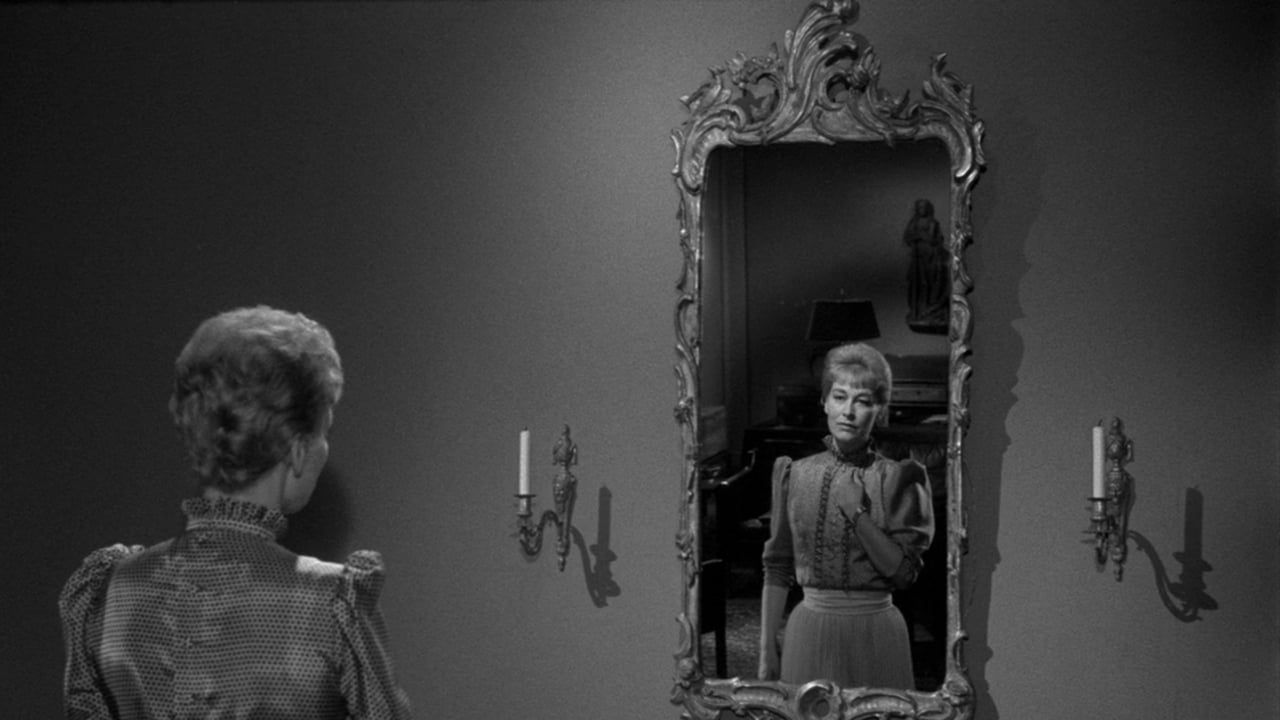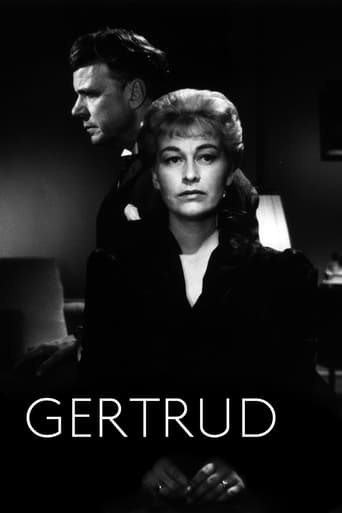

This was the last film from director Carl Theodor Dreyer (The Passion of Joan of Arc, Vampyr, Ordet), and this Danish film was listed as one of the 1001 Movies You Must See Before You Die in the book, so I was very keen. Basically, set in the early 20th Century in Stockholm, former opera singer Gertrud (Nina Pens Rode) is married to lawyer and politician Gustav Kanning (Bendt Rothe), she tells him that she has become upset that he cares more about his career and status than her, and she confesses that she has met another man who loves her and vice versa, so she wants a divorce. Her lover is the promising young pianist Erland Jansson (Baard Owe), she explains to him she is now devoted to him, she does not show up to meet Gustav who was picking her up at the evening opera, and she starts living with Jansson. The next evening though the Kannings do attend a house dinner party hosted by another man Gertrud had a relationship with in the past, poet Gabriel Lidman (Ebbe Rode), and also attending is her friend Axel Nygen (Axel Strøbye). Gustav decides to confront his wife about the night at the opera, and demands they spend time together for one more night before a divorce happens, and meanwhile she is told by Lidman that Jansson has been bragging about her being his latest conquest. Gertrud decides to give her new lover the chance to redeem himself by telling him she wants to leave everything else behind and go away with him, but he reveals he cannot do this as he is expecting another woman to give birth to his child. She leaves him and has another encounter with Lidman, he tries to convince her to go away with him instead, but she remembers in the past he too cared more for his career than her, so she refuses, and following this Gustav tries a last attempt to get her to stay with him, even allowing her another lover, but she moves to Paris alone to study psychology. Thirty years pass, and Gertrud looks back at her life and says to Nygen that the only meaningful thing in life is love, but she has not compromised her position being alone and giving into the attention of any man, she does not regret this decision or anything else. Also starring Karl Gustav Ahlefeldt, Vera Gebuhr as The Kannings' Maid, Lars Knutzon as Student orator, Anna Malberg as Kanning's mother and Edouard Mielche as The Rector Magnificus. The story of a woman having an affair out of marriage with another man who is not really in love with her is a good concept, the film is full of clever and interesting to watch scenes, especially those with long takes, including a near ten minute talk between the poet and his former love, the costumes and sets in black and white were good too, it is was a very intriguing and likable drama. Very good!
... View MoreIn the elegant world of artists and musicians, Gertrud ends her marriage to Gustav and takes a lover, the composer Erland Jansson.What we have here is a world of light and shadows and an ever-lingering camera. Apparently the film was not a huge success with audiences (which seems to be running theme for Dretyer) and even alienated the critics because the long camera shots.Do we need to see one long take of a couple talking on a couch? Of course not. But Dreyer knows what he is doing, and when we re-examine the film now, decades later, we see the subtle genius and brilliance of constructing it in this way -- turning what was a stage production into a masterful film.
... View MoreCarl Theodor Dreyer has always been seen as one of cinema's greats and his movies have been praised everywhere and are still being watched by many movie fanatics now days. I however must admit that I have never been a that big fan of his work. It always seemed to me all of his movies were technically very well made ones and visual stunning looking ones but its stories were however always lacking, which never made any of his movies really a pleasant experience for me.And it's not like the story itself is being bad written, it's more that it's being such an incredibly slow and stretched out one. Seriously, this is not a movie to watch late at night, when you are already feeling slightly tired because this movie will make no attempt at all to keep you awake. It's incredible how slow this movie gets told and half way in you start wondering if you'll make it to the end.Nothing wrong with slowly told movies of course, as long as the movie remains interesting and intriguing to watch throughout. And this just wasn't really the case for me. I just couldn't really get into this movie, due to the way it was being told and I must say I was glad when it was finally over. It doesn't help much that most of the characters are talking slow, soft and in a very depressed manner.But having said all this; I can still appreciate this movie for what it is and for what it's trying to do. You can't really call the movie bad for the way it is being made, since it's all done very deliberately and it succeeds at what it is trying to be. It just personally isn't really my cup of tea.You could say that the movie is providing an up close and personal look into a washed up marriage, told mostly from the female perspective. Its themes and story are all being quite daring and unusual for its time and the time period the movie is supposed to be set in. It's not being a standard, formulaic movie in any way and an unique movie experience on its own. It pretty much is a psychological movie, since it gives you a look into the mind of a woman, in search of love and true happiness, without having to make any compromises for it.Also visually, Carl Theodor Dreyer's last movie, is a wonderful looking one. He truly turned black & white cinematography into an art and the whole movie also has an old fashioned vibe to it.Well made and all, just not really my thing, I guess.7/10 http://bobafett1138.blogspot.com/
... View MoreWerner Erhard says, "You don't have to go looking for love when it is where you are coming from". For the chilly, statuesque wife in Carl Dreyer's last film Gertrud, love is not a living, breathing reality, but an ideal to be sought in its purest form. Reviled in its day for its being an artistic anachronism, Gertrud is now recognized for the complex masterpiece it truly is. With its long takes and static camera, it seems at odds with the French New Wave jump cuts and innovative techniques, yet it has much in common with those films of the 60s that depict the soulless fragmentation and alienation of modern life even though Gertrud takes place at the turn of the century.In Gertrud, love is something to strive for but is unattainable on Earth and each character (like perhaps Dreyer himself) is a figure living to one degree or another in loneliness. Shot with very few close-ups, the camera keeps us at a distance throughout, perhaps reminding us of the isolation of the human condition. Based on a 1906 play of the same name by Hjalmar Soderberg, Gertrud (Nina Pens Rode), a former professional singer, is an emotionally unfulfilled woman who finds something missing in the four primary relationships in her life. She is married to Gustav (Bendt Rothe), an ambitious politician, but sees him as being more interested in his career than in her.She is in love with a young concert pianist, Erland Jannson (Baard Owe), but is repelled by his consorting with other women and using her name to brag to others about his conquests. She feels that another suitor, poet Gabriel Lidman (Ebbe Rode), cares more about fulfilling his own desires than nurturing hers, and that psychologist Axel (Axel Strobye) is more interested in an intellectual liaison than a physical one. Although her emotional expression never becomes very intense, Gertrud tells Gustav that she is leaving him on the very day that he is supposed to receive a promotion to cabinet rank. Deeply hurt by her suggestion that he didn't show her enough love, he pleads with her not to leave him but his pleas are met with coldness.When she tells him that she is going to the opera that evening, he pursues her to the theater, only to discover that she did not tell him the truth about her whereabouts. In the drive to the opera, we are privy to Gustav's thoughts, the only time during the film that we are allowed entry into the character's mind. He is determined to win her back, only to discover later that she stayed at the home of Erland Jannson. In a subsequent meeting with Erland in the park, she asks him to go away with her so that they can live together by the sea but he rejects the idea, telling her that he has a relationship with Constance that he cannot break off. It is shortly thereafter that an old lover, poet Gabriel Lidman, reveals that he ran into Erland at a party, boasting of the fact that he had conquered the aloof Gertrud.Gabriel has returned to Denmark to receive an award and has his heart set on reviving his amorous relationship with Gertrud. However, in one of the film's most telling moments, shown in flashback, she recalls finding a note on Gabriel's desk that says "A woman's love and a man's work are mortal enemies". She uses that note to not only rebuff Gabriel but to reject all suitors and decide that she can never find happiness with a man. Refusing to compromise and stuck in the notion that spiritual fulfillment must include emotional pain, Gertrud at long last finds her destiny but only at the cost of emotional connection.
... View More